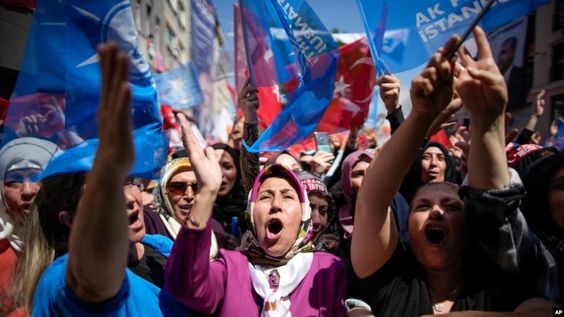Headlines
Turkish Parliament and Presidential Elections Are Currently Taking Place

Turkey’s historic legislative and presidential elections, which take place on Sunday, are likely to be hotly contested and may present President Recep Tayyip Erdogan with his greatest challenge to date in his 20 years in office.
The outcome of the referendum will either give the increasingly authoritarian Erdogan a second five-year term in government or move the NATO-member nation toward what Erdogan’s opponent in opposition deems a more democratic course.
Election day voting opened at 8 a.m. (0500 GMT) and ends at 5 p.m. (1400 GMT). Up until the embargo is removed at 9 p.m. (1800 GMT), media outlets are not permitted to release partial results. Exit polls are absent.
According to polls, populist Erdogan, 69, is starting a race behind a rival for the first time in his 20 years in office. Kemal Kilicdaroglu, the 74-year-old head of the center-left, pro-secular Republican People’s Party, or CHP, and the joint nominee of a united opposition alliance, has a modest advantage according to opinion polls. A runoff election will be held on May 28 to decide the winner of the presidency if neither contender receives more than 50% of the vote.
In the elections, which take place in the year Turkey celebrates the establishment of the republic, more than 64 million individuals, including 3.4 million foreign voters, are eligible to cast a ballot. In a nation where freedom of expression and assembly have been curtailed, Turkey’s historically high voter turnout demonstrates the country’s sustained belief in this form of civic engagement.
The elections take place against a backdrop of economic unrest that opponents attribute to the government’s poor management of the economy and a severe cost-of-living issue.
Turkey is still feeling the effects of the huge earthquake that devastated 11 southern provinces and killed more than 50,000 people in shaky structures in February. Erdogan’s administration has come under fire for its slow and ineffective response to the disaster, as well as the lax enforcement of building regulations that made the situation worse.
The elections are being widely monitored on a global scale as a test of a united opposition’s capacity to unseat a leader who has virtually all the state’s authority consolidated in his hands.
As in past elections, Erdogan used state resources and his control of the media to lead a divisive campaign. He has claimed that the opposition is supporting LGBTQ rights, which he claims is a threat to traditional family values, and that they are conspiring with “terrorists,” as well as calling them “drunkards” and other derogatory terms.
In an effort to win over people who have been badly struck by inflation, he has raised wages and pensions, subsidized electricity and gas bills, and highlighted domestic infrastructure and the defense industry in Turkey.
In addition to two nationalist groups, he has expanded the political alliance of his ruling Justice and Development Party, or AKP, with two minor Islamist parties.
Erdogan’s executive presidential system was narrowly approved by a referendum in 2017; Kilicdaroglu’s six-party Nation Alliance has pledged to overthrow it and reinstate parliamentary democracy. They have pledged to put checks and balances in place, restore the independence of the judiciary and the central bank, undo Erdogan’s suppression of opposition and free expression, and restore democracy.
The alliance consists of the nationalist Good Party, led by the former interior minister Meral Aksener, two ex-AKP parties, one of which is a tiny Islamist party, and parties led by the former prime minister Ahmet Davutoglu and the former finance minister Ali Babacan.
Kilicdaroglu is supported in the presidential contest by the main Kurdish political party of the nation, which is currently Turkey’s second-largest opposition group and has been the object of arrests and legal actions by the government.
Sinan Ogan, a former academic who is backed by a nationalist anti-immigrant party, is also vying for the presidency. A third contender, Muharrem Ince, a politician from the center-left who experienced a major decline in support, withdrew from the race on Thursday. However, the country’s electoral board ruled that his resignation was unlawful, therefore votes cast for him would still be tallied.
In addition, ballots will be cast for the 600-member parliament. To implement some of the promised democratic reforms, the opposition would require at least a majority.
Concern over the registration of over 9 million voters has arisen as a result of balloting in the 11 provinces affected by the earthquake.
Only 133,000 individuals have registered to vote in their new provinces after moving out of the earthquake zone, which is home to almost 3 million people. Bus transportation for voters was organized by political parties and non-governmental organizations, although it was unclear how many would return.
Many earthquake survivors will cast their ballots in improvised voting booths set up in school yards.
